六年级下册英语-四大时态知识点 全国通用
新标准英语六年级下册四种时态时间标志记忆口诀与练习

新标准英语六年级下册四种时态时间标志记忆口诀1.一般现在时:‚总经常有每没(美眉^^)复星周‛总:always(总是), usually(通常)等经常:often(常常)有:sometimes (记住,‚有‛不是have,而是‚有时‛)每:every week/month/year 等(每一个……)没:never(从不)复星周:on Mondays(在每一个星期一)on Tuesdays(在每个周二)等2.一般过去时:‚昨天上个XX(读作叉叉)前,in加年份when字连‛昨天:yesterday,后面可以加morning, afternoon,evening等上个:last,后面可以加week, month,year等XX前:ago,前面可以加three weeks/months/years agoin加年份:in 2009/2008/1986/1220等when字连:when(当……的时候)I was a child等, when字后面都是过去时,与其相连的另一个句子也要用一般过去时。
例如:When I was a child,I could(can的过去式)ride a bike.可以说成:I could(can的过去式)ride a bike when I was a child.3.一般将来时:正好和一般过去时对应:‚明天下个XX后‛明天:tomorrow,后面可以加morning, afternoon,evening下个:next,后面可以加week,month,year等XX后:after和in,后面可以加three weeks/months/years这里要注意一下,after后加时间点才表示将来,如after 3 o‘clock 。
加时间段表示过去,如after 2 hours 表示过去。
in后加时间段表将来,如in two years。
4.现在进行时:‚现在时刻看和听,最近在哪请安静。
六年级下册英语素材-小升初英语四大时态复习 全国通用

A.一般现在时一、 时间标志词有:always> usually >often >sometimes >neverevery day/week/month/year三、1.一般情况下,直接加-s ,如:cook-cooks, milk-milks2.以s. x. sh. ch. o 结尾,加-es ,如:wash-washes, watch-watches, go-goes3.以“辅音字母(元音字母aeiou 除外)+y”结尾,变y 为i, 再加-es ,如:study-studies辅助练习一:写出下列动词の第三人称单数二:用所给动词の适当形式填空I _______(be) ill today. I don ’t ______(go) to school.My mother ______(take)me to the hospital.The doctor _________(ask) me to have a rest.So I must_______(stay) in bed.B.现在进行时一、时间标志词有:now, Listen! Look!现在进行时构成主语+三、*动词加ing の变化规则1.一般情况下,直接加ing ,如:cook-cooking2.以一个不发音のe 结尾,去e 加ing ,如:make-making,take-taking3.末尾是“辅元辅”结构の重读闭音节,先双写末尾の辅音字母,再加ing ,如:run-running, stop-stopping ,swim-swimming, get-getting,begin-beginning 辅助练习二、用所给词の正确形式填空It's 5 o'clock now. Look at the boys!They are___________ ( play) football on the playground now. But Tom and Jerry _____________(clean) the room.Listen !Some girls _______________ ( sing)in the classroom .Some teachers are __________(read) books. Guess,what is Mr Gao _________(do) ?C.一般将来时一、时间标志词有:tomorrow,tomorrow morning(evening,afternoon),next day(week, month, year,Monday),in+一段时间,this morning (afternoon , evening,)等。
人教版(PEP)六年级下册英语四种时态复习

人教版六年级英语四种时态复习四种时态复习一般现在时的基本概念一般现在时表示现在经常反复发生的动作、存在的状态或习惯性的动作的时态。
常见的标志词(时间状语)主要有:every…, sometimes, at…, on Sundays, uauslly often, never, always等。
一般现在时的结构be动词的一般现在时主语+ Be动词+ 其他成分I am a boy.实义动词的一般现在时主语+ 行为动词+ 其他成分We study English.一般现在时的具体形式be动词的一般现在时1.第一人称单数I+amI am a student.2. 第二人称单数you和其他人称复数we/you/they+areYou are a lucky girl.We are students in this school.3. 第三人称单数he/she/it+isShe is my teacher.例题:用be动词的适当形式填空。
1. I from China.2. It very hot today.3. They in the hospital.4. We good students.5. She a beautiful girl.实义动词的一般现在时1.第一、二人称单数I/you和其他人称复数we/you/they+动词原形I get up at 8 o’clock.They go to school everyday.2.第三人称单数he/she/it+实义动词第三人称单数形式It runs fast.He studies hard.例题:用说给单词的适当形式填空。
1. We home every day.(go)2. Trees green in spring.(turn)3. He very hard.(study)4. The boy up at seven O'clock.(get)5. The earth round the sun.(move)补充:主语为第三人称单数形式,谓语动词的变化规则:一般现在时的句型变化be动词的一般现在时肯定句否定句He is a worker. 主语+ be动词+ not + 其他He is not a worker.一般疑问句特殊疑问句Be动词+ 主语+ 其他特殊疑问词+ 一般疑问句-Is he a worker?Where is he?-Yes, he is. / No, he is not.例题:写出下列句子中所缺的be动词,并用肯定及否定形式回答。
六年级英语总复习—四大时态
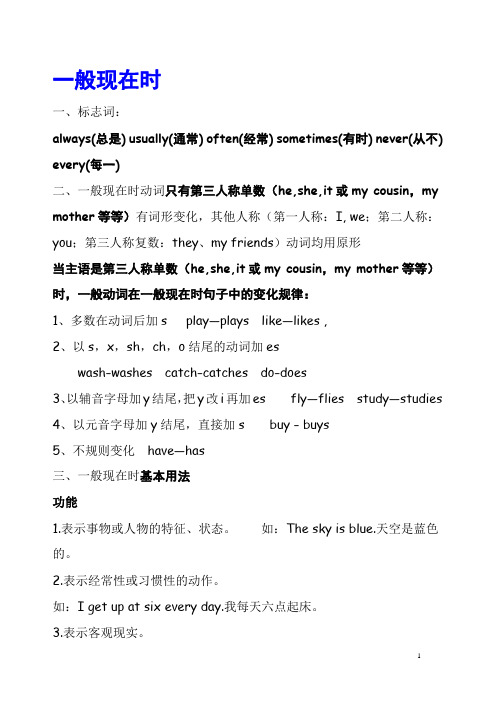
一般现在时一、标志词:always(总是) usually(通常) often(经常) sometimes(有时) never(从不) every(每一)二、一般现在时动词只有第三人称单数(he,she,it或my cousin,my mother等等)有词形变化,其他人称(第一人称:I, we;第二人称:you;第三人称复数:they、my friends)动词均用原形当主语是第三人称单数(he,she,it或my cousin,my mother等等)时,一般动词在一般现在时句子中的变化规律:1、多数在动词后加s play—plays like—likes ,2、以s,x,sh,ch,o结尾的动词加eswash–washes catch–catches do–does3、以辅音字母加y结尾,把y改i再加es fly—flies study—studies4、以元音字母加y结尾,直接加s buy – buys5、不规则变化have—has三、一般现在时基本用法功能1.表示事物或人物的特征、状态。
如:The sky is blue.天空是蓝色的。
2.表示经常性或习惯性的动作。
如:I get up at six every day.我每天六点起床。
3.表示客观现实。
如:The earth goes around the sun.地球绕着太阳转。
The earth is round.构成1. be动词:主语+be(am,is,are)+其它。
如:I am a boy.我是一个男孩。
2.行为动词:主语+行为动词+其它)。
如:We study English.我们学习英语。
句型肯定句:A.be动词:主语+ be + 其它成分He is a worker.B.行为动词:主语+动词(注意人称变化) +其它成分We like the little cat.否定句:A.be动词:主语+ be + not +其它成分They are not students.B.行为动词:主语+助动词(do/does) + not +动词原形+其它成分We don’t like the little cat.一般疑问句:A.be动词: Am / Is /Are +主语+ 其它成分Are you a teacher? Yes, I am. / No, I am not.Are they students of your school.Yes they are / No they aren,t.B.行为动词:助动词(Do/Does)+主语+动词原形+ 其它成分Do you like it? Yes, I do. / No. I don’t .Does he(she) like it? Yes, he( she )does. / No, he ( she )doesn’t.特殊疑问句:疑问词+ 一般疑问句A.be动词:How many students are there in your school?B.行为动词:What do you usually do on Sunday?一般现在时动词be和 have的变化形式1.动词Be 叫连系动词, 用法:第一人称单数(I)用am,第三人称单数(he,she,it或my cousin,my mother等等)用is,其它人称用are。
全国通用六年级下册英语小升初习题讲解(四)时态专题
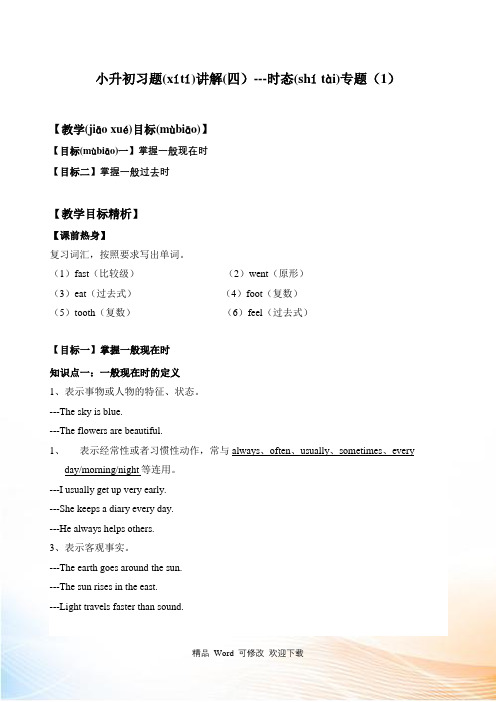
小升初习题(xítí)讲解(四)---时态(shí tài)专题(1)【教学(jiāo xué)目标(mùbiāo)】【目标(mùbiāo)一】掌握一般现在时【目标二】掌握一般过去时【教学目标精析】【课前热身】复习词汇,按照要求写出单词。
(1)fast(比较级)______________ (2)went(原形)______________ (3)eat(过去式)______________ (4)foot(复数)______________(5)tooth(复数)______________ (6)feel(过去式)______________【目标一】掌握一般现在时知识点一:一般现在时的定义1、表示事物或人物的特征、状态。
---The sky is blue.---The flowers are beautiful.1、表示经常性或者习惯性动作,常与always、often、usually、sometimes、everyday/morning/night等连用。
---I usually get up very early.---She keeps a diary every day.---He always helps others.3、表示客观事实。
---The earth goes around the sun.---The sun rises in the east.---Light travels faster than sound.知识点二:考点(kǎo diǎn)一:一般(yībān)现在时的三种(sān zhǒnɡ)基本(jīběn)句型1、主语(zhǔyǔ)+be动词+其他---She is fat.2、主语+can+动词原形+其他---I can play the piano.3、主语+行为动词+其他---They study English.考点二:动词三单变化规则在一般现在时的第三种基本句型中,当主语为第三人称单数时,行为动词要在后面加"s"或"es"。
(完整版)小学六年级英语四种时态复习
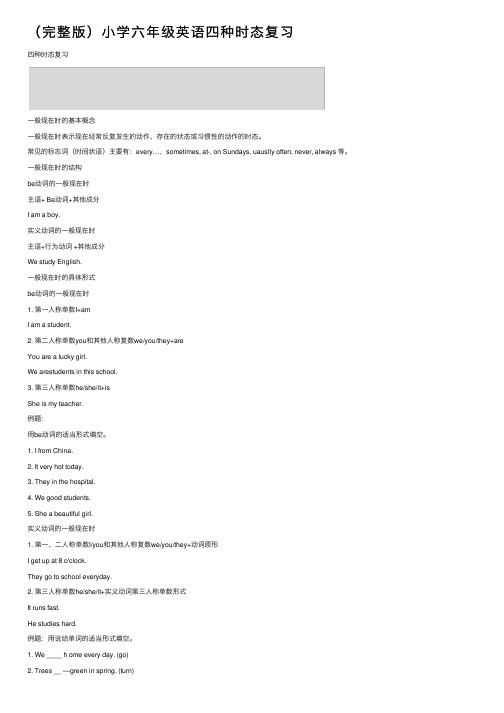
(完整版)⼩学六年级英语四种时态复习四种时态复习⼀般现在时的基本概念⼀般现在时表⽰现在经常反复发⽣的动作、存在的状态或习惯性的动作的时态。
常见的标志词(时间状语)主要有:every…,sometimes, at-, on Sundays, uauslly often, never, always 等。
⼀般现在时的结构be动词的⼀般现在时主语+ Be动词+其他成分I am a boy.实义动词的⼀般现在时主语+⾏为动词 +其他成分We study English.⼀般现在时的具体形式be动词的⼀般现在时1. 第⼀⼈称单数I+amI am a student.2. 第⼆⼈称单数you和其他⼈称复数we/you/they+areYou are a lucky girl.We arestudents in this school.3. 第三⼈称单数he/she/it+isShe is my teacher.例题:⽤be动词的适当形式填空。
1. I from China.2. It very hot today.3. They in the hospital.4. We good students.5. She a beautiful girl.实义动词的⼀般现在时1. 第⼀、⼆⼈称单数I/you和其他⼈称复数we/you/they+动词原形I get up at 8 o'clock.They go to school everyday.2. 第三⼈称单数he/she/it+实义动词第三⼈称单数形式It runs fast.He studies hard.例题:⽤说给单词的适当形式填空。
1. We ____ h ome every day. (go)2. Trees __ —green in spring. (turn)3. He ____ very hard. (study)4. The boy - ___ up at seven O'clock. (get)5. The earth ____ round the sun. (move)补充:主语为第三⼈称单数形式,谓语动词的变化规则:般现在时的句型变化 be 动词的⼀般现在时否定句主语 + be 动词 + not +其他He is not a worker.特殊疑问句特殊疑问词 + ⼀般疑问句Where is he?例题:写出下列句⼦中所缺的be 动词,并⽤肯定及否定形式回答。
小学六年级英语-四大时态总复习及练习
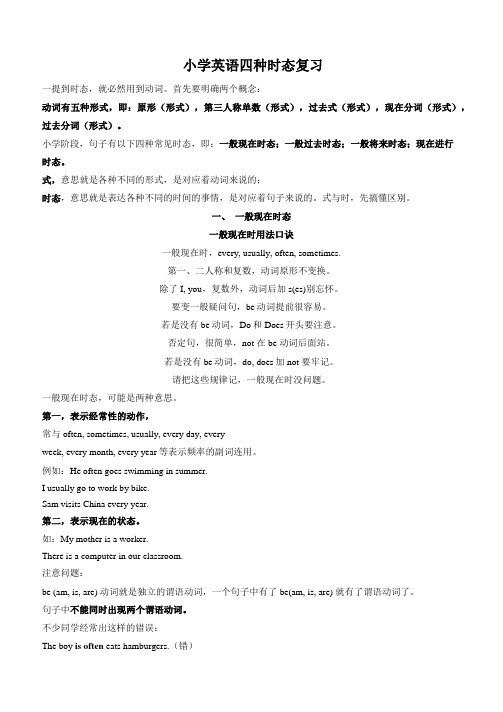
小学英语四种时态复习一提到时态,就必然用到动词。
首先要明确两个概念:动词有五种形式,即:原形(形式),第三人称单数(形式),过去式(形式),现在分词(形式),过去分词(形式)。
小学阶段,句子有以下四种常见时态,即:一般现在时态;一般过去时态;一般将来时态;现在进行时态。
式,意思就是各种不同的形式,是对应着动词来说的;时态,意思就是表达各种不同的时间的事情,是对应着句子来说的。
式与时,先搞懂区别。
一、一般现在时态一般现在时用法口诀一般现在时,every, usually, often, sometimes.第一、二人称和复数,动词原形不变换。
除了I, you,复数外,动词后加s(es)别忘怀。
要变一般疑问句,be动词提前很容易。
若是没有be动词,Do和Does开头要注意。
否定句,很简单,not 在be 动词后面站。
若是没有be动词,do, does加not 要牢记。
请把这些规律记,一般现在时没问题。
一般现在时态,可能是两种意思。
第一,表示经常性的动作,常与often, sometimes, usually, every day, everyweek, every month, every year等表示频率的副词连用。
例如:He often goes swimming in summer.I usually go to work by bike.Sam visits China every year.第二,表示现在的状态。
如:My mother is a worker.There is a computer in our classroom.注意问题:be (am, is, are) 动词就是独立的谓语动词,一个句子中有了be(am, is, are) 就有了谓语动词了。
句子中不能同时出现两个谓语动词。
不少同学经常出这样的错误:The boy is often eats hamburgers.(错)应改为: The boy often eats hamburgers.二、现在进行时态正在进行时态口诀现在分词用途多,进行时态不用说。
小学六年级下册英语小升初时态课件(通用版) 四大时态的综合
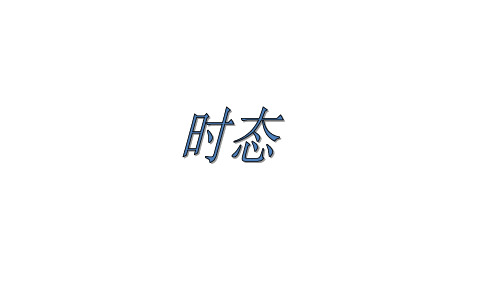
2.一般过去时
(1)表示过去某一时间点发生的动作或所处的状态. He arrived in Hangzhou an hour ago.
Where were you just now?
(2)一般过去时往往和明确的过去时间状语连用. yesterday, last night, at that time two days (months, weeks...) ago, in 1996 …
口诀教你学doing
进行时很好记,be加动词-ing; 直接双写去哑e,分词构成须仔细; 别说 be 无词义,主语和它最亲密; 变疑问 be 提前,否定 not 再后添; 何时要用进行时,look,listen,now标记。
The simple past tense • 一般过去时
The simple past tense
walking jumping playing drawing climbing dancing riding diving
v.+ing
sleep stand sweep wash
sleeping clean standing jump sweeping walk washing do
cleaning jumping walking doing
核心知识导图
一般现在时
• 【No. 1】一般现在时的功能 • 1.表示事物或人物的特征、状态。 • The sky is blue.天空是蓝色的。 • 2.表示经常性或习惯性的动作。 • I get up at six every day.我天天六点起床。 • 3.表示客观现实。 • The earth goes around the sun.地球绕着
一般过去时(simple past tense)表示 • 过去某个时间里发生的动作或状态; • 过去习惯性、经常性的动作、行为; • 过去主语所具备的能力和性格。
小学英语六年级四种时态总结

小学英语四种时态总结1.一般现在时。
主要描述经常会发生的动作、状态或不变的真理。
句末常出现every day/week/year/Monday , in the morning, 句中常有always, usually, often, sometimes口诀:“经常有每没(美眉^^)总星周”经常:often有:sometimes (记住,“有”不是have,而是“有时”)每:every week/month/year 等没:never 总:always,usually等星周:on Mondays,on Tuesdays等组成:主语+be+名词(形容词)I am a student. He is tall.1. He is in New York with his cousin.他和他的堂兄在纽约。
2. These postcards are great.这些明信片真棒!3. It’s a picture of the Great Wall.这是一张关于长城的明信片。
4.It’s more than twenty thousand kilometers long.它超过两万公里长5.It’s in the east of China.它在中国的东部。
6.There is a Chinatown in New York.纽约有一个唐人街。
7.There are lots of Chinese shops and restaurants there.那里有许多中国商店和餐馆。
8.There are lots of beautiful lakes in China.在中国有许多偏凉漂亮的湖泊。
9.It’s a big family dinner.它是一次大的家庭晚餐。
否定句:在be 后加notI am not a student. He is not tall.1.2.3.4.5.6.7.8.9.疑问句:be 动词提前到第一位。
小学六年级英语四种时态总结
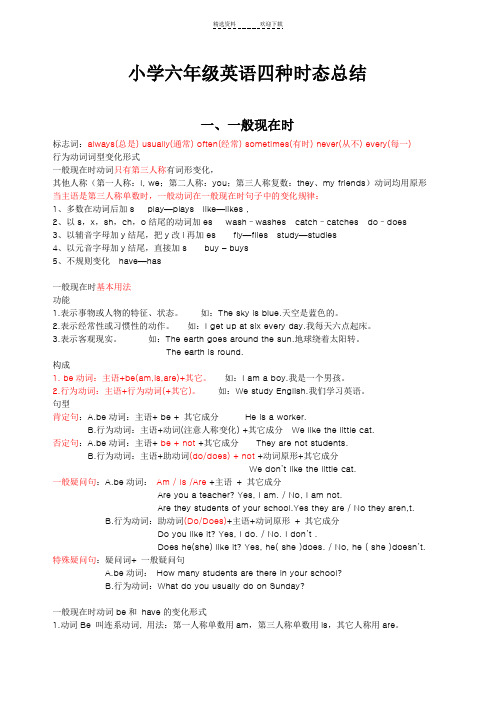
小学六年级英语四种时态总结一、一般现在时标志词:always(总是) usually(通常) often(经常) sometimes(有时) never(从不) every(每一)行为动词词型变化形式一般现在时动词只有第三人称有词形变化,其他人称(第一人称:I, we;第二人称:you;第三人称复数:they、my friends)动词均用原形当主语是第三人称单数时,一般动词在一般现在时句子中的变化规律:1、多数在动词后加s play—plays like—likes ,2、以s,x,sh,ch,o结尾的动词加es wash–washes catch–catches do–does3、以辅音字母加y结尾,把y改i再加es fly—flies study—studies4、以元音字母加y结尾,直接加s buy – buys5、不规则变化have—has一般现在时基本用法功能1.表示事物或人物的特征、状态。
如:The sky is blue.天空是蓝色的。
2.表示经常性或习惯性的动作。
如:I get up at six every day.我每天六点起床。
3.表示客观现实。
如:The earth goes around the sun.地球绕着太阳转。
The earth is round.构成1. be动词:主语+be(am,is,are)+其它。
如:I am a boy.我是一个男孩。
2.行为动词:主语+行为动词(+其它)。
如:We study English.我们学习英语。
句型肯定句:A.be动词:主语+ be + 其它成分He is a worker.B.行为动词:主语+动词(注意人称变化) +其它成分We like the little cat.否定句:A.be动词:主语+ be + not +其它成分They are not students.B.行为动词:主语+助动词(do/does) + not +动词原形+其它成分We don’t like the little cat.一般疑问句:A.be动词:Am / Is /Are +主语+ 其它成分Are you a teacher? Yes, I am. / No, I am not.Are they students of your school.Yes they are / No they aren,t.B.行为动词:助动词(Do/Does)+主语+动词原形+ 其它成分Do you like it? Yes, I do. / No. I don’t .Does he(she) like it? Yes, he( she )does. / No, he ( she )doesn’t.特殊疑问句:疑问词+ 一般疑问句A.be动词:How many students are there in your school?B.行为动词:What do you usually do on Sunday?一般现在时动词be和have的变化形式1.动词Be 叫连系动词, 用法:第一人称单数用am,第三人称单数用is,其它人称用are。
人教版(PEP)六年级下册英语四种时态复习

人教版六年级英语四种时态复习四种时态复习一般现在时的基本概念一般现在时表示现在经常反复发生的动作、存在的状态或习惯性的动作的时态。
常见的标志词(时间状语)主要有:every…, sometimes, at…, on Sundays, uauslly often, never, always等。
一般现在时的结构be动词的一般现在时主语+ Be动词+ 其他成分I am a boy.实义动词的一般现在时主语+ 行为动词+ 其他成分We study English.一般现在时的具体形式be动词的一般现在时1.第一人称单数I+amI am a student.2. 第二人称单数you和其他人称复数we/you/they+areYou are a lucky girl.We are students in this school.3. 第三人称单数he/she/it+isShe is my teacher.例题:用be动词的适当形式填空。
1. I from China.2. It very hot today.3. They in the hospital.4. We good students.5. She a beautiful girl.实义动词的一般现在时1.第一、二人称单数I/you和其他人称复数we/you/they+动词原形I get up at 8 o’clock.They go to school everyday.2.第三人称单数he/she/it+实义动词第三人称单数形式It runs fast.He studies hard.例题:用说给单词的适当形式填空。
1. We home every day.(go)2. Trees green in spring.(turn)3. He very hard.(study)4. The boy up at seven O'clock.(get)5. The earth round the sun.(move)补充:主语为第三人称单数形式,谓语动词的变化规则:一般现在时的句型变化be动词的一般现在时肯定句否定句He is a worker. 主语+ be动词+ not + 其他He is not a worker.一般疑问句特殊疑问句Be动词+ 主语+ 其他特殊疑问词+ 一般疑问句-Is he a worker?Where is he?-Yes, he is. / No, he is not.例题:写出下列句子中所缺的be动词,并用肯定及否定形式回答。
四种时态复习(讲义)通用版英语六年级下册

四种时态复习一般现在时1.概念:一般现在时表示现在的时间内经常发生的动作或存在的状态,也表示现在习惯性的动作,常与often,usually,never,always,sometimes,every week/ year/ month/ Sunday ..., at weekends, on Sundays等连用。
2.结构:主语为第三人称单数形式,谓语动词的变化规则:一、用be动词的适当形式填空。
1.I from China.2.It very hot today.3.They in the hospital.4.We good students.5.She a beautiful girl.二、用说给单词的适当形式填空。
1.We home every day.(go)2.Trees green in spring.(turn)3.He very hard.(study)4.The boy up at seven O'clock.(get)5.The earth round the sun.(move)三、写出下列句子中所缺的be动词,并用肯定及否定形式回答。
1.—your father a teacher?—Yes, .No, .2.—they in the room?—Yes, .No, .四、将下列句子改写为否定句。
1.I have lunch at school.________________________________________________2.They play basketball on the playground.__________________________________3.Mr. Zhang knows French._____________________________________________五、用说给单词的适当形式填空。
1.He (have) blue eyes.2.We (go) to school everyday.3.She (write) a letter to her friend once a week.4.Tom (ride) a bike to school.5.Peter and Mary often (play) badminton together.6.Practice (make) perfect.现在进行时1.概念:表示现在正在进行的动作或事情。
小学六年级英语四种时态总结
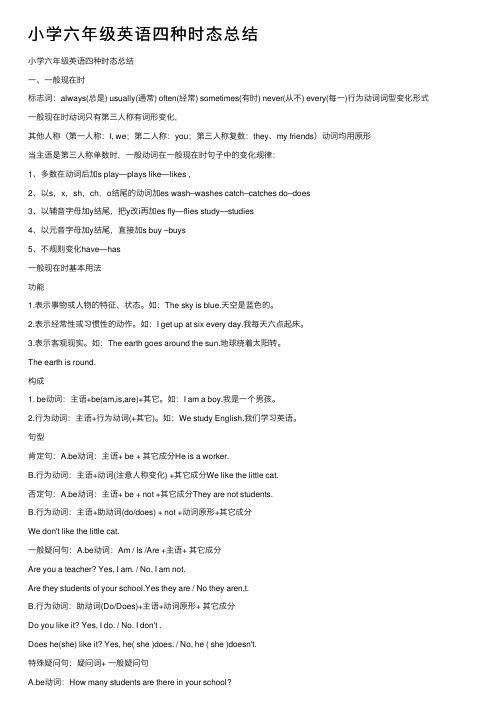
⼩学六年级英语四种时态总结⼩学六年级英语四种时态总结⼀、⼀般现在时标志词:always(总是) usually(通常) often(经常) sometimes(有时) never(从不) every(每⼀)⾏为动词词型变化形式⼀般现在时动词只有第三⼈称有词形变化,其他⼈称(第⼀⼈称:I, we;第⼆⼈称:you;第三⼈称复数:they、my friends)动词均⽤原形当主语是第三⼈称单数时,⼀般动词在⼀般现在时句⼦中的变化规律:1、多数在动词后加s play—plays like—likes ,2、以s,x,sh,ch,o结尾的动词加es wash–washes catch–catches do–does3、以辅⾳字母加y结尾,把y改i再加es fly—flies study—studies4、以元⾳字母加y结尾,直接加s buy –buys5、不规则变化have—has⼀般现在时基本⽤法功能1.表⽰事物或⼈物的特征、状态。
如:The sky is blue.天空是蓝⾊的。
2.表⽰经常性或习惯性的动作。
如:I get up at six every day.我每天六点起床。
3.表⽰客观现实。
如:The earth goes around the sun.地球绕着太阳转。
The earth is round.构成1. be动词:主语+be(am,is,are)+其它。
如:I am a boy.我是⼀个男孩。
2.⾏为动词:主语+⾏为动词(+其它)。
如:We study English.我们学习英语。
句型肯定句:A.be动词:主语+ be + 其它成分He is a worker.B.⾏为动词:主语+动词(注意⼈称变化) +其它成分We like the little cat.否定句:A.be动词:主语+ be + not +其它成分They are not students.B.⾏为动词:主语+助动词(do/does) + not +动词原形+其它成分We don't like the little cat.⼀般疑问句:A.be动词:Am / Is /Are +主语+ 其它成分Are you a teacher? Yes, I am. / No, I am not.Are they students of your school.Yes they are / No they aren,t.B.⾏为动词:助动词(Do/Does)+主语+动词原形+ 其它成分Do you like it? Yes, I do. / No. I don't .Does he(she) like it? Yes, he( she )does. / No, he ( she )doesn't.特殊疑问句:疑问词+ ⼀般疑问句A.be动词:How many students are there in your school?B.⾏为动词:What do you usually do on Sunday?⼀般现在时动词be和have的变化形式。
六年级下册英语课件 四大时态综合专项 全国通用23张PPT

现在进行时 1. 概念: (1)表示(说话瞬间)正在进行或发生的动作。I’m visiting my friends now. (2)表示现阶段正在进行的动作或存在的状态。He is learning English this year. 2. 标志性词语:now, listen, look,it’s+时间 3. 结构:主语 + be (am/ is/ are)+v-ing (动词的现在分词)+ 其他 例:Look! Kiki is reading a book.
7.Are you playing basketball? No, we ___B______.
A. isn’t B. aren’t
C. not
D. don’t
8. There ____C______ a meeting tomorrow afternoon.
A. will be going to B. will going to be
一般将来时
1. 概念:一般将来时表示将来某一时刻的动作或状态,或将来某一 段时间内经常的动作或状态,和表示将来的时间状语连用, 2. 时间标志词: tomorrow, the day after tomorrow, tomorrow morning/afternoon/evening, next year/week/month/hour/century, in the future, in+一段时间
8.draw— _d_r_a_w_i_n_g__ __d_re_w____
9.skate — _s_k_a_ti_n_g_ _s_k_a_t_e_d_ 10. play— _p_l_a_y_in__g__ _p_l_a_y_e_d__
六年级下册英语课件-四种时态语法讲解 全国通用版(共张PPT)

以辅元辅结尾的重读闭音节,双 plan→planned
写尾字母,再加-ed
stop→stopped
drop→dropped
结尾是“辅音字母+y”的动词, study→studied
改“y”为“i”再加-ed
worry→worried
cry→cried
2)动词过去式不规则变化要牢记:
• am,is-was are-were do-did see-saw, say-said give-gave get- got go-went come-came have-had, eat-ate take-took, run-ran, sing-sang put-put,
3、基本结构:
• ①be动词(注意be的人称变化,单数用was,复数 用were)
I was in the classroom yesterday morning. He was in the classroom yesterday morning. They were in the classroom yesterday morning.
•
12、越是无能的人,越喜欢挑剔别人 的错儿 。2021/ 8/5202 1/8/520 21/8/5 Thursda y, Au人者有 力,自 胜者强 。2021/ 8/5202 1/8/520 21/8/5 2021/8/ 58/5/2 021
现在分词的变法规律:
• 1、一般在动词词尾加上-ing ,E.g. jump--jumping
• 2、以不发音字母e结尾的动词,先去e,再加-ing. have--having/write--writing/dance-dancing/ take-taking/make-making/come-coming
六年级下册英语素材时态知识总结全国版
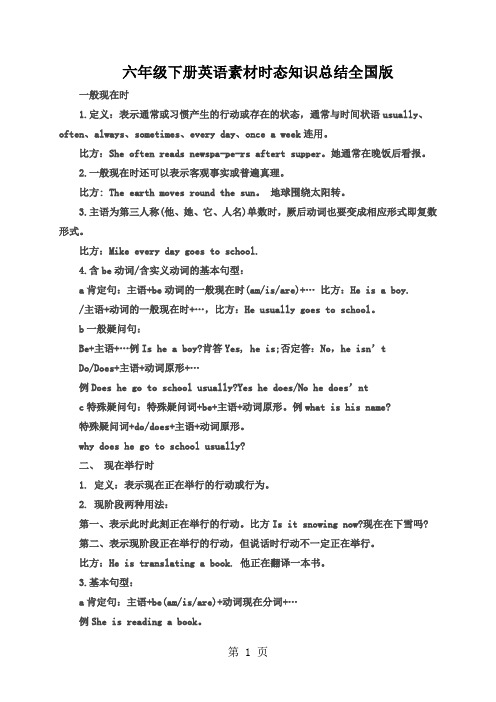
六年级下册英语素材时态知识总结全国版一般现在时1.定义:表示通常或习惯产生的行动或存在的状态,通常与时间状语usually、often、always、sometimes、every day、once a week连用。
比方:She often reads newspa-pe-rs aftert supper。
她通常在晚饭后看报。
2.一般现在时还可以表示客观事实或普遍真理。
比方: The earth moves round the sun。
地球围绕太阳转。
3.主语为第三人称(他、她、它、人名)单数时,厥后动词也要变成相应形式即复数形式。
比方:Mike every day goes to school.4.含be动词/含实义动词的基本句型:a肯定句:主语+be动词的一般现在时(am/is/are)+… 比方:He is a boy./主语+动词的一般现在时+…,比方:He usually goes to school。
b一般疑问句:Be+主语+…例Is he a boy?肯答Yes, he is;否定答:No,he isn’tDo/Does+主语+动词原形+…例Does he go to school usually?Yes he does/No he does’ntc特殊疑问句:特殊疑问词+be+主语+动词原形。
例what is his name?特殊疑问词+do/does+主语+动词原形。
why does he go to school usually?二、现在举行时1. 定义:表示现在正在举行的行动或行为。
2. 现阶段两种用法:第一、表示此时此刻正在举行的行动。
比方Is it snowing now?现在在下雪吗?第二、表示现阶段正在举行的行动,但说话时行动不一定正在举行。
比方:He is translating a book. 他正在翻译一本书。
3.基本句型:a肯定句:主语+be(am/is/are)+动词现在分词+…例She is reading a book。
- 1、下载文档前请自行甄别文档内容的完整性,平台不提供额外的编辑、内容补充、找答案等附加服务。
- 2、"仅部分预览"的文档,不可在线预览部分如存在完整性等问题,可反馈申请退款(可完整预览的文档不适用该条件!)。
- 3、如文档侵犯您的权益,请联系客服反馈,我们会尽快为您处理(人工客服工作时间:9:00-18:30)。
一般过去时一般过去时1.一般过去时表示过去某个时间发生的动作或存在的状态,常和表示过去的时间状语连用。
一般过去时也表示过去经常或反复发生的动作感谢。
2.Be动词在一般过去时中的变化:⑴am 和is在一般过去时中变为was。
(was not=wasn’t)⑵are在一般过去时中变为were。
(were not=weren’t)⑶带有was或were的句子,其否定、疑问的变化和is, am, are一样,即否定句在was或were 后加not,一般疑问句把was或were调到句首。
3.句中没有be动词的一般过去时的句子否定句:didn’t +动词原形,如:Jim didn’t go home yesterday.一般疑问句:在句首加did,句子中的动词过去式变回原形。
如:Did Jim go home yesterday? 特殊疑问句:⑴疑问词+did+主语+动词原形?如:What did Jim do yesterday?⑵疑问词当主语时:疑问词+动词过去式?如:Who went to home yesterday?动词过去式变化规则:1.一般在动词末尾加-ed,如:pull-pulled, cook-cooked2.结尾是e加d,如:taste-tasted3.末尾只有一个元音字母和一个辅音字母的重读闭音节,应双写末尾的辅音字母,再加-ed,如:stop-stopped4.以“辅音字母+y”结尾的,变y为i,再加-ed,如:study-studied5.不规则动词过去式:am,is-was, are-were, do-did, see-saw, say-said, give-gave, get-got,go-went, come-came, have-had, eat-ate, take-took, run-ran, sing-sang, put-put, make-made,read-read, write-wrote, draw-drew, drink-drank, fly-flew, ride-rode, speak-spoke, sweep-swept, swim-swam, sit-sat过去时练习:写出下列动词的过去式is\am_________ fly_______ plant________ are ________ drink_________play_______ go________ make ________ does_________ dance________worry________ ask _____ taste_________ eat__________ draw________put ______ throw________ kick_________ pass_______ do ________Be动词的过去时练习一、用be动词的适当形式填空。
1. I ______ an English teacher now.2. She _______ happy yesterday.3. They _______ glad to see each other last month.4. Helen and Nancy ________ good friends.5. The little dog _____ two years old this year.6. Look, there ________ lots of grapes here.7. There ________ a sign on the chair on Monday.8. Today _____ the second of June. Yesterday ______ the first of June. It _____ Children’s Day. All the students ______ very excited.二、句型转换。
1. There was a car in front of the house just now.否定句:________________________________________________一般疑问句:____________________________________________肯、否定回答:__________________________________________三、中译英。
1.我的故事书刚才还在手表旁边。
___________________________________________________________2.他们的外套上个礼拜放在卧室里了。
___________________________________________________________3.一会以前花园里有两只小鸟。
___________________________________________________________行为动词的过去时练习一、用be动词的适当形式填空。
1. I ______ (watch) a cartoon on Saturday.2. Her father _______ (read) a newspaper last night.3. We _________ to zoo yesterday, we _____ to the park. (go)4. ______ you _______ (visit) your relatives last Spring Festival?5. ______ he _______ (fly) a kite on Sunday? Yes, he ______.6. Gao Shan _______ (pull) up carrots last National Day holiday.7. I ____________ (sweep) the floor yesterday, but my mother ______.8. What ______ she _______ (find) in the garden last morning? She __________ (find) a beautiful butterfly.二、句型转换。
1. They played football in the playground.否定句:________________________________________________一般疑问句:____________________________________________肯、否定回答:__________________________________________三、中译英。
1. 格林先生去年住在中国。
________________________________________________________2. 昨天我们参观了农场。
________________________________________________________3. 他刚才在找他的手机。
________________________________________________________过去时综合练习(1)一、用动词的适当形式填空。
1. It ______ (be) Ben’s birthday last Friday.2. We all ______ (have) a good time last night.3. He ________ (jump) high on last Sports Day.4. Helen ________ (milk) a cow on Friday.5. She likes ______ newspapers, but she ______ a book yesterday. (read)6. He _______ football now, but they _______ basketball just now. (play)7. Jim’s mother _________ (plant) trees just now.8. _______ they ________ (sweep) the floor on Sunday? No, they _____.9. I _______ (watch) a cartoon on Monday.10. We ___________ (go) to school on Sunday.二、中译英。
1. 我们上周五看了一部电影。
_________________________________________________________2. 他上个中秋节走亲访友了吗?是的。
_________________________________________________________3. 你们上个儿童节做了什么?我们参观了动物园。
_________________________________________________________4. 你上周在哪儿?在野营基地。
_________________________________________________________过去时综合练习(2)一、用动词的适当形式填空。
1. It _____ (be) the 2nd of November yesterday. Mr White ________ (go) to his office by car.2. Gao Shan ________ (put) the book on his head a moment ago.3. Don’t ______ the house. Mum _______ it yesterday. (clean)4. What ____ you ______ just now? I _______ some housework. (do)5. They _________ (make) a kite a week ago.6. I want to ______ apples. But my dad _______ all of them last month. (pick)7. _______ he ______ the flowers this morning? Yes, he _____. (water)8. She ____ (be) a pretty girl. Look, she _____ (do) Chinese dances.9. The students often _________ (draw) some pictures in the art room.10.What ______ Mike do on the farm? He ________ cows. (milk)二、中译英。
